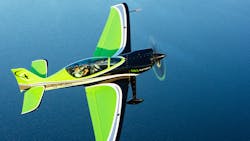Game Composites Receives Production Certificate from Federal Aviation Administration
Bentonville, Ark. (6/12/2019) – Bentonville-based aircraft manufacturer Game Composites has obtained its Production Certificate as issued by The Federal Aviation Administration, marking the first time in 23 years such a certificate has been awarded to a general aviation manufacturer.
The Production Certificate marks the last of many milestones for Game Composites in the journey to a production plane, from its beginning as a clean sheet aircraft design, over the long certification and testing period, to establishing a production and build a team.
Game Composites CEO Philipp Steinbach, also the chief designer of the GB1 Gamebird, said the production certificate clears the runway for the company to produce and deliver certified aircraft to customers worldwide. “From our humble beginnings in a rented shack in Europe 6 years ago, I am proud of what we have achieved as a team, and the appreciation we all receive from our customers, as well as the regulators involved in this program,” Steinbach said. The process of taking an aircraft through to production is a long and rigorous one.
Steinbach said other important certifications preceded the Production Certificate, which marks one of the company’s final hurdles. “Another important milestone was the Type Certificate, defining the airplane in all its technical details, Steinbach said. “The Production Certificate is the culmination of 2 years of work defining and building the team and the organization, including the quality system, while under constant surveillance by the FAA to ensure highest quality.” The first production model of the GB1 Gamebird went into the world in November of 2019, and since then, six more GB1 Gamebirds have been completed and delivered to their owners. Steuart Walton is Steinbach’s partner in Game Composites. He said the accomplishment marks a major step for the company.
“The GB1 Gamebird is truly innovation at its best, and I couldn’t be happier for the team and what they’ve accomplished in reaching this major milestone,” Walton said. “It’s so exciting to think about their path forward as a real contributor to the aviation community and Bentonville at-large.”
Produced from the ground up in Bentonville, the GB1 Gamebird’s capability to compete in the highest levels of aerobatic competition and airshows, when coupled with its versatility as a trainer and travelling machine, makes the aircraft unique in its category as a general aviation machine. The GB1 has a roll rate of 400 degrees per second, and can handle a maximum load factor of +/- 10 G. Added to this impressive performance capability, the airplane can also be utilized comfortably for crosscountry flights, making it more versatile than any other aircraft in this class.
The GB1 can achieve cruise speeds of over 200kts with a range of over 1000 nautical miles. A flight from Phoenix, Arizona, to Bentonville has been performed in just over 5 hours, and several flights from Bentonville to Denver, Colorado in under 3 hours. The Gamebird is produced adjacent to Louise Thaden Field in Bentonville, which has become a focal point for general aviation in Arkansas. The airfield is named after Bentonville-born Aviatrix Louise Thaden, who redefined what women could do behind the controls of an aircraft, breaking records and shattering perceptions in early 1930’s America.
The airfield is home to OZ1, the state’s premier flying club, and FlyOZ, Arkansas’ backcountry aviation network that connects grass airstrips across the state for the sake of experiencing new adventure. The Gamebird makes a fitting inclusion at Thaden Field, which is aimed at access to aviation in a greater sense. The FIELDHOUSE at Thaden Field makes flight feel accessible, replacing traditional barriers with viewing areas and intending to rekindle the youthful wonder that comes from looking to the skies. Game Composites has 19 GB1 Gamebirds on order, and produces around one plane per month. Steinbach said he expects the company to be producing as many as two planes per month by the end of 2019. #


